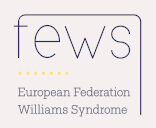Williams Syndrome (WS) is a rare disorder, caused by a microdeletion in chromosome number 7. The lost material contains approximately 20 contiguous genes, with most notably elastin, which is the “marker gene”. WS is a non-hereditary syndrome that occurs at random and shows a wide variation in ability from person to person. It can affect brain development in varying degrees, combined with some physical effects or physical problems. These range from lack of coordination, slight muscle weakness, possible heart defects and occasional kidney damage. Development is delayed and atypical. The incidence of WS is thought to be somewhere between 1:7,500 to 1:20,000.
At present, due to its rarity, too few front-line medical and social care professionals are aware of this syndrome. Paediatricians in particular often lack the necessary experience to make the correct diagnosis, and this means that many Williams Syndrome children and their families are not given adequate opportunity to address their problems. However, we in the FEWS, are dedicated to redressing this imbalance, by helping to raise awareness and by facilitating a cross-border exchange of knowledge.
So far our experience with interventions, such as physio-, occupational- and languagetherapies have shown very good results. It is important to start with therapies as early as possible, in order to achieve the best possible results.
You can find more information about FEWS in our flyer:
